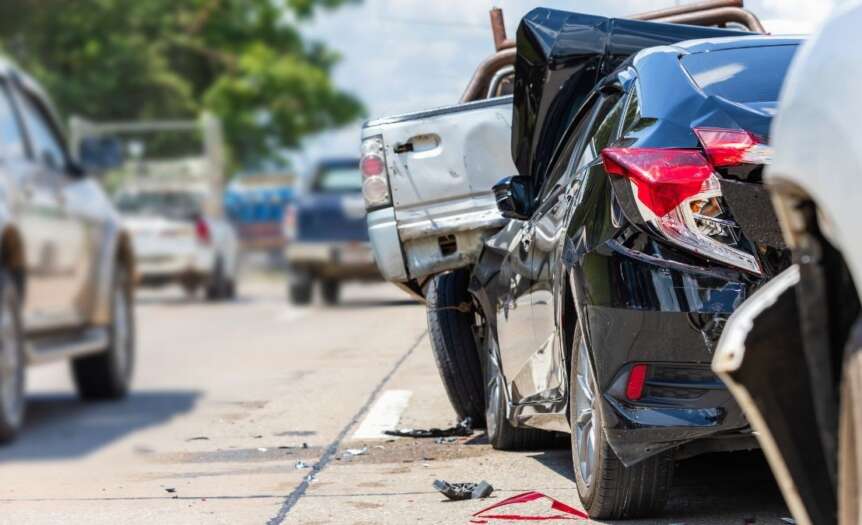Almost all of us will be involved in an auto accident at some point; if you drive enough, it’s practically inevitable. Do you know what to do in the event of a collision? We’ve put together a handy checklist of what to do after a car accident to improve the unpleasant experience.
Ensure Everyone’s Safety
Safety is always the priority, so ensure that you, your passengers, and everyone else involved are alright in the immediate aftermath of an auto accident. If anyone requires medical attention, even if it seems minor, call 911 immediately and explain the situation.
If everyone is OK, turn on the hazard lights and move the cars out of the way. If it’s a significant collision with much debris, let the police handle it and stay off the road safely.
Exchange Information
Once everyone’s safe and the police are on their way, it’s good to exchange information right away. Don’t worry about whose fault it is—that’ll get sorted in the accident report. Information you should swap with other drivers in the accident includes:
- Contact info (phone number, email address, etc.)
- Vehicle info (make, model, year, and license plate)
- Insurance information (phone number, policy number)
If there are witnesses to the incident, such as pedestrians nearby or other drivers who saw but were not involved, get their contact information. They may be helpful to your insurance claim later on.
Document Scene
The police will document the scene themselves, but you should also start a file of notes and photos on your phone of the accident. Use your phone’s notes app if you don’t have a paper to jot down your immediate recollection of what happened in as much detail as possible.
Take photos of all the damage you can see on your car and damage to the other vehicles involved in the accident. If you have injuries, photograph those immediately, too. It’s always a good idea to be thorough when dealing with insurance.
Contact Insurance
While you’re waiting for the police to arrive, or if you have a spare couple of minutes, contact your insurance company as soon as you can. It’ll get the ball rolling on filing a claim so you can get through the process faster.
Plus, if your car needs towing, an insurance company might be able to handle sending a tow truck to the scene and bringing it to an auto collision shop, so you don’t have to worry about it.
Track Repairs & Treatment
Eventually, you’ll leave the scene, but that doesn’t mean the incident is over. Keep any receipts and other documents related to repairs or medical treatment stemming from the accident for future insurance purposes.
If your vehicle requires repairs, you’ll need a detailed repair estimate for your future claim. Sometimes, pain and soreness won’t be noticeable until the next day, but you should still keep track of it and add it to your claim.
There’s a lot to do after a car accident than we’ve listed here. Now you know the gist of what to do after a collision to make the process simpler and allow you to return to everyday life quickly.










 Deering Estate
Deering Estate
 Massage Envy South Miami
Massage Envy South Miami
 Calla Blow Dry
Calla Blow Dry
 My Derma Clinic
My Derma Clinic
 Sushi Maki
Sushi Maki
 Sports Grill
Sports Grill
 The Healthy Kitchen
The Healthy Kitchen
 Golden Rule Seafood
Golden Rule Seafood
 Malanga Cuban Café
Malanga Cuban Café

 Kathleen Ballard
Kathleen Ballard
 Panter, Panter & Sampedro
Panter, Panter & Sampedro
 Vintage Liquors
Vintage Liquors
 The Dog from Ipanema
The Dog from Ipanema
 Rubinstein Family Chiropractic
Rubinstein Family Chiropractic
 Your Pet’s Best
Your Pet’s Best
 Indigo Republic
Indigo Republic




 ATR Luxury Homes
ATR Luxury Homes


 2112 Design Studio
2112 Design Studio
 Hamilton Fox & Company
Hamilton Fox & Company
 Creative Design Services
Creative Design Services
 Best Pest Professionals
Best Pest Professionals
 HD Tree Services
HD Tree Services
 Trinity Air Conditioning Company
Trinity Air Conditioning Company
 Cisca Construction & Development
Cisca Construction & Development
 Mosquito Joe
Mosquito Joe
 Cutler Bay Solar Solutions
Cutler Bay Solar Solutions


 Miami Royal Ballet & Dance
Miami Royal Ballet & Dance
 Christopher Columbus
Christopher Columbus
 Pineview Preschools
Pineview Preschools
 Westminster
Westminster
 Carrollton
Carrollton
 Lil’ Jungle
Lil’ Jungle
 Frost Science Museum
Frost Science Museum
 Palmer Trinity School
Palmer Trinity School
 South Florida Music
South Florida Music
 Pinecrest Orthodontics
Pinecrest Orthodontics
 Dr. Bob Pediatric Dentist
Dr. Bob Pediatric Dentist
 d.pediatrics
d.pediatrics
 South Miami Women’s Health
South Miami Women’s Health

 The Spot Barbershop
The Spot Barbershop
 My Derma Clinic
My Derma Clinic




 Miami Dance Project
Miami Dance Project

 Rubinstein Family Chiropractic
Rubinstein Family Chiropractic
 Indigo Republic
Indigo Republic

 Safes Universe
Safes Universe
 Vintage Liquors
Vintage Liquors
 Evenings Delight
Evenings Delight





 Atchana’s Homegrown Thai
Atchana’s Homegrown Thai
 Baptist Health South Florida
Baptist Health South Florida

 Laser Eye Center of Miami
Laser Eye Center of Miami
 Visiting Angels
Visiting Angels
 OpusCare of South Florida
OpusCare of South Florida

 Your Pet’s Best
Your Pet’s Best





 HD Tree Services
HD Tree Services
 Hamilton Fox & Company
Hamilton Fox & Company


 Creative Design Services
Creative Design Services